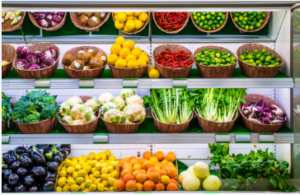Commercial refrigeration equipment stores food products, kitchen utensils and other items at ideal temperatures to prevent spoilage, which is critical in food service industries like restaurants and cafeterias.
Refrigerators and freezers help extend the shelf life of perishable goods while decreasing overhead costs by keeping them at a lower temperature. Plus, their energy efficiency saves your business money on electricity costs! Check here coldlogic.com.au/commercial-refrigeration-adelaide.
Refrigerators
 Commercial refrigerators are large appliances commonly found in food establishments. Their primary function is keeping food at its optimal temperature and preventing bacteria growth while improving quality and saving on utility costs. Furthermore, these energy-efficient units help businesses reduce operational expenses.
Commercial refrigerators are large appliances commonly found in food establishments. Their primary function is keeping food at its optimal temperature and preventing bacteria growth while improving quality and saving on utility costs. Furthermore, these energy-efficient units help businesses reduce operational expenses.
Refrigerators have become an increasingly popular appliance. There are various sizes, styles and prices to suit different budgets available on the market; many even use less energy than standard models! With such options becoming ever more widespread among households today.
These commercial refrigeration models are created explicitly for high-demand use in commercial settings and can withstand even the harshest environments. Furthermore, their stylish appearance will appeal more strongly to customers.
Various commercial refrigerators are on the market today, each boasting distinctive features. These can include freezers, display units and pharmaceutical refrigerators.
Refrigerators are usually constructed out of stainless steel and equipped with digital controls that enable you to set the ideal temperature for whatever food items are stored inside them.
Refrigerating air with compressor and condenser technology is the primary means of refrigeration. A compressor compresses liquid refrigerants into high-temperature/pressure gas refrigerants which then pass to the condenser for cooling before eventually becoming gaseous refrigerants that absorb much heat from surrounding air.
At some point, the refrigerant condenses into steam that is then released back into the environment, making the refrigerators more energy-efficient and conserving resources. Although this process may appear simple enough, it helps make refrigerators more energy-efficient while saving on costs.
Refrigerated commercial refrigerators have many applications in various commercial settings, from restaurants and hospitals to laboratories, shops, retail stores, and flower and fruit markets.
Refrigerators serve many functions, from keeping fruits and vegetables fresh to storing milk, juice and other dairy products. Furthermore, these devices can also help preserve meat, fish and poultry products so they last longer on store shelves.
Refrigerators explicitly designed for commercial use with superior insulation and long lifespan are often the most energy-efficient options, keeping food at a constant temperature and saving on maintenance and repair bills over time. Check here coldlogic.com.au/commercial-refrigeration-adelaide.
Freezers
Refrigerators like these are ideal for ice cream stores, cafes and restaurants. Their stylish appearance attracts customers while making your business appear professional and clean.
These freezers come in various colours and finishes to complement your business decor and are easy to keep running smoothly – making them an invaluable investment for any organisation.
Food processing companies rely heavily on freezers to store products at temperatures that maintain freshness before shipping them out to retailers. Multiple freezers may even be present within their warehouses to keep products cold. It is especially crucial when dealing with meats or foodstuffs that must be stored long before being distributed as retail merchandise.
When looking for a commercial freezer for your business, opt for one with superior temperature control and thick wall insulation. Such freezers will allow bulk foods to remain at safe temperatures while offering features like lid locks and baskets to help organise items inside them.
Cooling Systems
Commercial cooling systems can be found in restaurants, grocery stores and convenience stores to keep food fresh while also helping protect products from damage and save energy costs. Furthermore, they extend the lifecycle of commercial refrigeration equipment by increasing efficiency.
Chiller systems are refrigeration units that utilise water as the medium for heat transfer. While typically used to cool liquids, chillers may also be used for air conditioning.
These chillers are often installed within buildings, though they can also cool space in industrial facilities and factories. Various kinds of chillers utilise different refrigerant types.
Chillers are often utilised in large commercial buildings but can provide excellent solutions for smaller businesses. Chillers use an energy-saving refrigeration process that circulates chilled water between an evaporator, compressor, condenser and expansion device.
No matter which chiller type your business employs, implementing a maintenance plan is vital to ensuring its efficiency and safe functioning; doing so could prevent costly repairs in the future.
Preventive maintenance of any refrigeration plant is vital to its optimal functioning and long-term durability, uncovering any conditions that require repairs or replacement in advance.